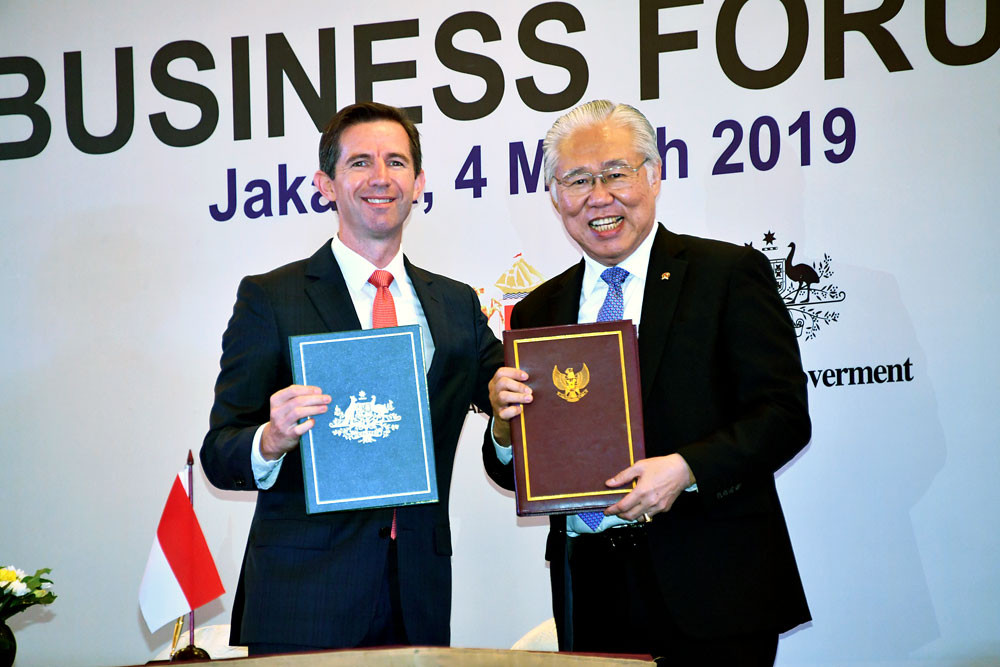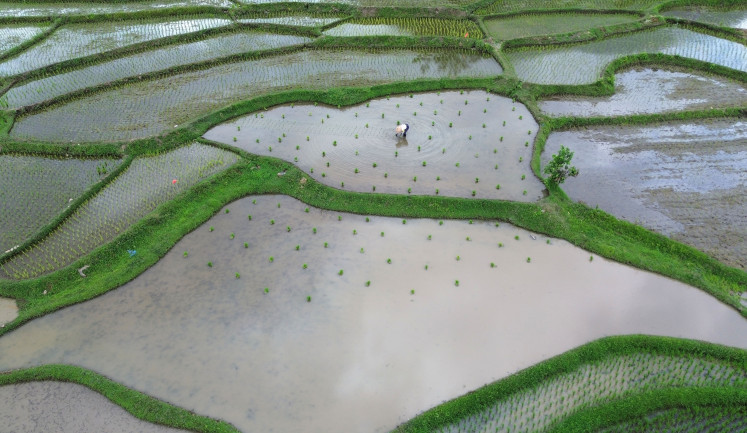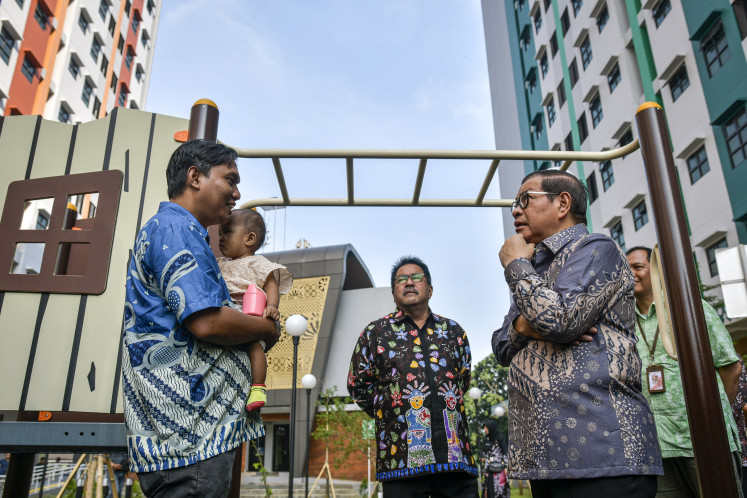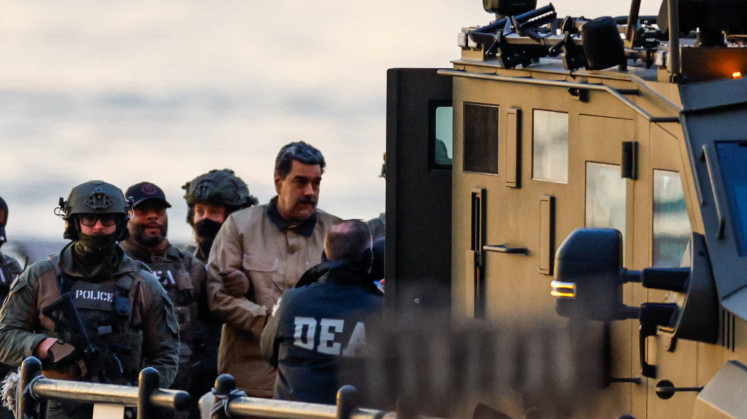Popular Reads
Top Results
Can't find what you're looking for?
View all search resultsPopular Reads
Top Results
Can't find what you're looking for?
View all search resultsA second honeymoon for Indonesia and Australia
Like in a marriage, Indonesia and Australia seem to be enjoying their “second honeymoon” after signing a lucrative — both economically and politically — comprehensive economic partnership agreement (CEPA) in Jakarta on Monday.
Change text size
Gift Premium Articles
to Anyone
 Art of the deal: Trade Minister Enggartiasto Lukita (right) and his Australian counterpart Simon Birmingham hold documents after signing a trade deal in Jakarta on Monday. Indonesia and Australia signed a long-awaited deal after months of diplomatic tension over Canberra’s contentious plan to move its embassy to Jerusalem. (AFP/Adek Berry)
Art of the deal: Trade Minister Enggartiasto Lukita (right) and his Australian counterpart Simon Birmingham hold documents after signing a trade deal in Jakarta on Monday. Indonesia and Australia signed a long-awaited deal after months of diplomatic tension over Canberra’s contentious plan to move its embassy to Jerusalem. (AFP/Adek Berry)
L
ike in a marriage, Indonesia and Australia seem to be enjoying their “second honeymoon” after signing a lucrative — both economically and politically — comprehensive economic partnership agreement (CEPA) in Jakarta on Monday. Thanks to the landmark deal, 6,474 goods and products from Indonesia will be exempted from import tariffs in Australia. Australia will scrap 94 percent of tariffs on Indonesian goods, and its service providers in education, mining and health services will enjoy easier access to Indonesia.
While Australia has been fully prepared for the CEPA, it remains to be seen whether Indonesia will take the utmost benefit of the pact. In the future, the two countries are unlikely to face major hurdles in their bilateral ties, because, among other reasons, Australia is more realistic in dealing with Indonesia, and also because for Indonesia, Australia is becoming less important in terms of economic, political and security aspects.
Although the agreement still needs the House of Representatives’ ratification to take effect, we can safely conclude that the deal was struck largely thanks to President Joko “Jokowi” Widodo’s pragmatism and lack of interest in complicated and time-consuming diplomacy. It was perfectly combined by the persistence of Australian leaders — especially former prime minister Malcolm Turnbull and the incumbent PM Scott Morrison — in luring Jokowi with economic advantages Indonesia can take from this agreement.
So when was the two neighbors’ “first honeymoon” then? To me it occurred when Paul Keating served as Australian prime minister from 1991 to 1996. Keating was apparently the only western leader who could win the trust of then-Indonesian leader Soeharto, and as a consequence, won major economic and political concessions from the dictator. Soeharto then was free to do whatever he liked in East Timor.
Personal relations between Keating and Soeharto went so deep that they could understand each other only by reading their body language. Australia under Keating tried to remain low profile although it was actually opposed to Indonesia’s occupation of East Timor.
Keating came to power shortly after the Nov. 12, 1991 massacre in the former Portuguese colony. At that time Indonesian soldiers opened fire on East Timorese youths who were gathering at Santa Cruz cemetery. Hundreds were reportedly killed in the incident, but the actual facts never came to the surface. Keating was relatively quiet about this gross human rights violation.
Before discussing further about the new chapter in bilateral ties between the two countries, let me remind this nation of our debts to Australia that we can never repay because of their monumental and everlasting values of humanity.
We Indonesians will be forever grateful to Australia for the sacrifice of nine their best servicemen and women in early April 2005. They died in an air accident when their Sea King helicopter from aircraft-carrier HMAS Kanimbla crashed in a mission to carry aid to Nias, just several days after an earthquake devastated the island off North Sumatra. When a tsunami swept Aceh and Nias in December 2004, Australia was among the first nations to rush to offer assistance.
Then-president Susilo Bambang Yudhoyono conveyed the nation’s deepest condolences on the death of the nine soldiers when he visited Australia a few days after the accident.
We should feel ashamed that Indonesian terrorists killed 88 Australian nationals in the Bali bombing that claimed 202 lives on Oct. 12, 2002. The same terror group also attacked the Australian Embassy in Jakarta in September 2004. Later, Australia helped the National Police (Polri) upgrade their antiterrorist knowledge, technology and management.
Much earlier, in 1945 thousands of Australian port workers refused to load Dutch ships carrying arms and supplies to be used in its struggle to reoccupy its former colony Indonesia, which had declared its independence on Aug. 17. Then-premier Sutan Sjahrir reportedly promised to pay off the debt by supporting Australia’s independence.
Only Australians know how much they owe to Indonesia.
Back to the trade agreement, Trade Minister Enggartiasto Lukita and his Australian counterpart Simon Birmingham signed the long-awaited deal nine years after the negotiation started. It is a major diplomatic victory for both Jokowi and Morrison, especially in the face of their domestic audiences ahead of elections. Indonesia will hold its legislative and presidential elections on April 17, while Australia will hold its parliamentary election on May 18.
Jokowi will use this new trade deal to prove his consistency in defending Palestine, because he approved the pact only after Morrison backtracked from his election promise to move the Australian Embassy in Israel from Tel Aviv to Jerusalem. For Morrison the trade agreement will be more substantial in winning the election because even the opposition Labor Party will be very willing to sign such a lucrative agreement with Indonesia.
The CEPA signing only proves an improving trend in relations between Indonesia and Australia. In August last year, they inked a Joint Declaration on a strategic partnership, which was based on the 2006 Lombok Treaty. The partnership covers five broad pillars of cooperation: Enhancing economic and development partnership, connecting people, securing the two nations and the region’s shared interests, maritime cooperation and contributing to Indo-Pacific stability and prosperity.
If the first honeymoon between the two came at the expense of human rights, how about the second one? Only time will tell. But there is plenty of honey available for both Indonesia and Australia to keep the relationship healthy and to withstand the challenges in the years ahead together.










